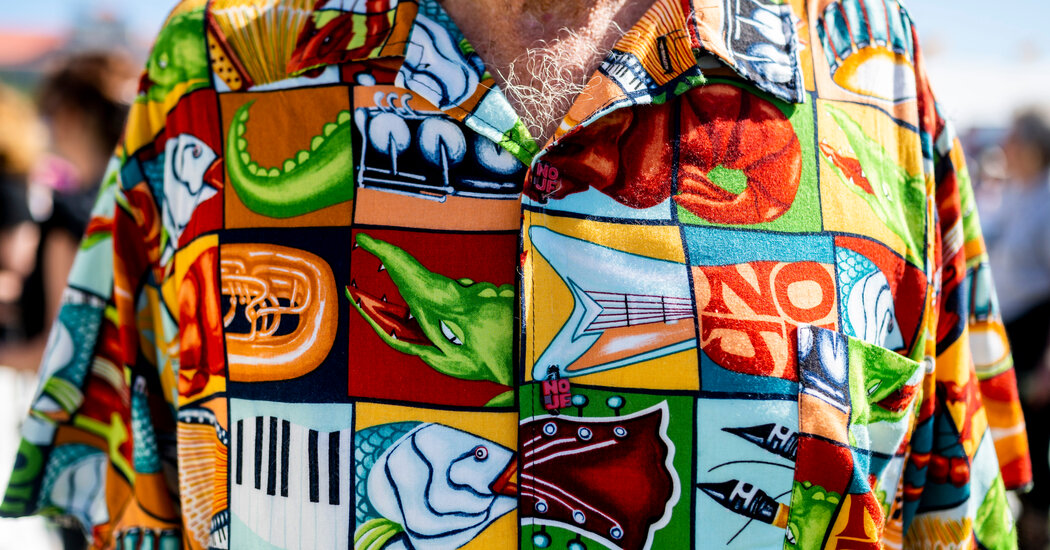
It all started with a poster.
In 1975, while in graduate school at Tulane University, Bud Brimberg had to come up with a project for a business class. His idea: have an artist in New Orleans create a poster as merchandise for a local music festival.
That event, now known as the New Orleans Jazz & Heritage Festival, has become one of the city’s cultural staples. This year’s Jazz Fest, held over seven days in April and May, featured hundreds of performers across 14 stages. According to organizers, about 460,000 people (including staff and vendors) attended.
Since 1975, each Jazz Fest has been commemorated with an artist-designed poster. Mr. Brimberg, 73, still oversees their production. And since 1981, he has also made printed Hawaiian shirts sold at the festival. After introducing the shirts, which also feature a unique motif each year, Mr. Brimberg started to offer other pieces, including shorts and dresses.
The clothes, called BayouWear, have turned into a sort of unofficial uniform for Jazz Fest attendees and performers like Irma Thomas, a soul singer and a festival fixture known for taking the stage in a custom dress featuring the latest print.
“Whenever someone wears the clothing, the festival, along with the culture that created it, lives on,” said Quint Davis, the producer of Jazz Fest, who has helped plan the event since it began in 1970.
Lisa Alexis, the director of the Office of Cultural Economy in New Orleans, said the BayouWear clothes have also come to represent the city itself. “Everyone looks forward to the design each year,” she said. “It just seems to give a very comprehensive representation and feel of our New Orleans culture.”
On a Friday at this year’s festival, Ann Patteson, 78, from New Orleans, said she was wearing one of the 18 BayouWear shirts in her collection. For her, the shirts represent just about every Jazz Fest she has attended.
Austin Hajna, a 36-year-old physician assistant from Washington, D.C., was one of dozens of people browsing the shirts ($59), shorts ($39), dresses ($59) and sleeveless tops ($49) at a tent selling BayouWear. Many pieces featured the 2023 print — an architectural motif inspired by buildings in the French Quarter — and there were lots of clothes from past festivals.
Mr. Hajna, who had a drink in his hand, was wearing a blue shirt covered with green streetcars and turquoise palm trees, the 2015 print. He said it was one of two BayouWear shirts he owns, adding that he planned to buy a third that day, “right after a sip of this vodka.”
Jamel Banks, a 38-year-old engineer from Houston, was in line behind Mr. Hajna. His shirt featured a colorful Pucci-inspired print of a dancing man that was introduced in 2019. The shirts, he said, “feel very father-ish — but a cool dad.”
“I’m ready for the matching shorts now,” Mr. Banks added, “and something for my girlfriend.”
Though clothes with past BayouWear prints are still sold, certain designs are harder to find. Original samples and stock of the 2001 print — plates of sugar-dusted beignets next to mugs of cafe au lait — were destroyed during Hurricane Katrina, Mr. Brimberg said.
BayouWear garments are made entirely of rayon, which Mr. Brimberg said he chose because it dries fast, hangs loose and displays colors more vividly than other fabrics. “The gradations were missing in cotton,” he said, zooming in on a photo of the 2003 print (a jumble of crawfish) to show how the color of the crustaceans faded from a deep orange into a pale coral.
Mr. Brimberg — who grew up in Brooklyn and has the mannerisms, and accent, of Larry David — comes up with ideas for BayouWear prints himself before finding artists to help bring them to life. He said his references over the years have included pointillist and Cubist art, the brand Marimekko and the French glassmaker Lalique.
The ideas for the prints themselves, he said, typically strike at random, often while he is roaming around New Orleans. The first print, in 1981, was inspired by a palm-tree-dotted shirt on a man playing an upright piano in that year’s Jazz Fest poster.
Kathy Schorr, a textile artist in New Orleans who helped make BayouWear’s 2023 architectural print, said she loves how fluid the designs are. “You can’t tell what it is until you’re right up on it,” Ms. Schorr said. “They just look like a beautiful pattern from a distance.”
The buttons on many BayouWear shirts are no less thoughtfully designed than the prints. To match certain motifs, Mr. Brimberg has had buttons custom made to look like tiny drums (for a percussion-themed print from 2016), guitar picks (for a print from 2006) and water-meter covers (for this year’s architectural print).
For shirts featuring yellow-eyed alligators from 1999, Mr. Brimberg had buttons made to look like the reptiles’ teeth. “I went down to the voodoo museum and bought some alligator teeth,” he recalled. “Then I took them to my dentist, since they were kind of ugly, and asked if he could do some cosmetic dentistry to polish them up. And I had that cast as a button.”
At the opening day of this year’s Jazz Fest, Kayla Biskupovich, 26, from New Orleans, was wearing an alligator-print shirt over a dress covered in watermelon slices, the print from 2014. “This dress was my mom’s, she bought it the year this pattern came out,” said Ms. Biskupovich, who graduated recently from Louisiana State University.
For a better fit, she tied knots at the dress’s back to tighten it. “I didn’t want to cut it, because that would be sacrilegious,” Ms. Biskupovich said.
“I also wanted to wear the gators,” she added as she held out one of her shirt’s triangular white buttons. “Look at the teeth! Could you die?!”













